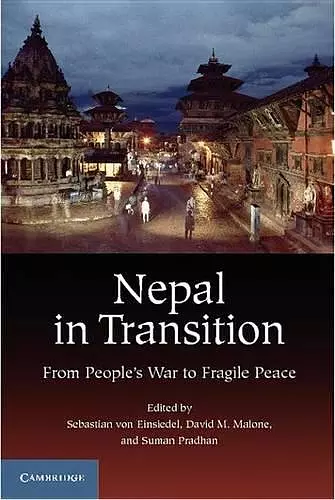Nepal in Transition
From People's War to Fragile Peace
David M Malone editor Sebastian von Einsiedel editor Suman Pradhan editor
Format:Paperback
Publisher:Cambridge University Press
Published:12th Mar '12
Currently unavailable, and unfortunately no date known when it will be back

This volume analyzes the context, dynamics and key players shaping Nepal's ongoing peace process.
Since emerging in 2006 from a ten-year Maoist insurgency, the 'People's War', Nepal has struggled with the difficult transition from war to peace, from autocracy to democracy, and from an exclusionary and centralized state to a more inclusive and federal one. The present volume, drawing on both international and Nepali scholars and leading practitioners, analyzes the context, dynamics and key players shaping Nepal's ongoing peace process. While the peace process is largely domestically driven, it has been accompanied by wide-ranging international involvement, including initiatives in peacemaking by NGOs, the United Nations and India, which, throughout the process, wielded considerable political influence; significant investments by international donors; and the deployment of a Security Council-mandated UN field mission. This book shines a light on the limits, opportunities and challenges of international efforts to assist Nepal in its quest for peace and stability and offers valuable lessons for similar endeavors elsewhere.
'Six years ago, the overthrow of the Nepalese monarchy and a negotiated peace brought the self-declared (but not Chinese-endorsed) Maoist insurgents into government in Nepal. Today, the country is stuck. The parties are deadlocked, the police and the courts are ineffective, and the bureaucracy is corrupt. Despite an agreement to merge forces, the army and the insurgents sit in separate camps, poised to resume fighting. A promised new constitution is overdue. The rural poverty, bonded-labor practices, and social and political exclusion of ethnic and caste minorities that sparked the insurgency remain unaddressed. Some benefit was gained from international aid efforts and two now-terminated UN missions, one focused on human rights and the other on peace monitoring - but not enough to create momentum. Nepal's giant neighbors, China and India, contend for strategic position with little concern for Nepal's complex internal problems. The book's deeply informed contributors from the diplomatic, nongovernmental organization, academic, and journalistic worlds look hard for rays of hope, but they find few.' Foreign Affairs
'Although a considerable time is required to alter dynamics of Nepali politics and to achieve sustainability in peace processes, this volume provides an in-depth assessment of Nepal's transition and present it as a valuable case study for those countries undergoing a similar transition. The subject matter is very impressive and beneficial for both academics and practitioners.' Padmini Tomer, Academic Council on the United Nations System
ISBN: 9781107668980
Dimensions: 226mm x 152mm x 20mm
Weight: 550g
414 pages